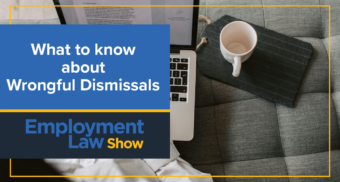5 Common Questions About Termination (And answers you need) | Employment Law Show TV – S6 E03
Episode Summary
5 COMMON QUESTIONS ABOUT TERMINATION, unpaid overtime pay, deadline to pursue severance and more on Season 6 Episode 03 of the Employment Law Show with employment lawyer Lior Samfiru, Partner at Samfiru Tumarkin LLP.
Watch above to discover your workplace rights and learn everything you need to know about employment law in Ontario, British Columbia, and Alberta, on the only employment law show on both TV and radio in Canada.
Episode Notes
Placed on unpaid leave as a result of vaccination status
My employer told me if I am not vaccinated, I will be put on an unpaid leave of absence. Can they do this and how long can it last?
- Vaccine policies in the workplace: Employers generally do not have the right to place an employee on unpaid leave. Employees can treat the unpaid leave as constructive dismissal and termination and pursue their severance. Employees can choose to accept unpaid leave if they wish. Employers are only permitted to place employees on unpaid leave if there is a government mandate in place that imposes mandatory vaccinations in the workplace.
- LEARN MORE
COVID-19 Knowledge Centre
- LEARN MORE
Employee severance entitlements when the company shuts down
My 35-year-old son’s international employer is closing their Canadian office. He’s worked there for 9 years as their national operations manager. Do they owe him more than 10 weeks’ pay in severance?
- Severance pay calculations: Severance pay is based on a number of factors including the age of an employee, the length of employment as well as the position. While the minimum entitlements of an employee are approximately a week per year of service, an employee’s full severance entitlements are often much more. Before agreeing to a severance offer it is important for employees to contact an employment lawyer to determine what they are owed. Most employees are often offered much less severance than what they are initially given.
Fired for asking for unpaid overtime pay
After working overtime for years without any extra pay, I finally confronted my boss about it. I was fired a few days later without warning. I did get two weeks’ pay for severance. Is there anything I can do about the unpaid overtime?
- Overtime pay and entitlements: Employees are obligated to be paid overtime if worked the necessary amount of overtime hours per week, even if they were not asked to work extra time. Salaried employees are also entitled to overtime pay. Employers are also not able to penalize employees who are advocating for their rights; it is considered a reprisal. Employees who have not been paid their appropriate wages can file a complaint with the Ministry of Labour but should contact an employment lawyer to discuss adequate severance.
5 Common Questions About Termination (And Answers You Need)
- Does my employer need a good reason to fire me: Employers are permitted to terminate an employee for any reason, as long as it is not discriminatory and adequate severance is offered. Employers do not have to have a valid reason or offer the reason for termination to a former employee.
- Can I be fired without severance for performance issues: Employers can only avoid paying an employee severance if they have exhibited serious misconduct and have shown that necessary disciplinary measures were taken prior to termination. It is typically very difficult to terminate an employee for cause as employers have to build a case for termination.
- Does a layoff count as a termination: Employers do not have the right to temporarily lay off an employee without their consent despite the pandemic. In most cases, a layoff is considered to be a termination and employees who have been laid off can pursue their severance entitlements.
- Let go and I’m a contractor: Despite being classified as a contractor, many individuals are actually employees and are entitled to severance after they are terminated. Individuals who do not set their own schedule and compensation and most of the parameters of their job are set by an employer, they are employees. Misclassified employees are entitled to other employee rights such as vacation pay, overtime pay, etc.
- Changes are made to your job or you were harassed at work: Employers do not have the right to make fundamental changes to an employee’s position without their consent. Significant changes at the workplace, as well as an unsafe or toxic work environment, can lead to constructive dismissal. Employees who leave as a result of harassment at work are considered to have been terminated and can pursue their severance entitlements.
Time limit on pursuing severance
Is there a time limit on how long after your termination you can pursue severance?
- Deadlines to pursuing severance: Employees have up to two years after the initial date of the termination in order to pursue their severance. It is important for employees to pursue their rights as soon as possible and contact an employment lawyer to determine what they are owed.
Terminated for cause after a customer complaint
I was written up after a rude customer complained to my manager. My manager told me that if I’m written up again, I’ll be fired. I refused to sign the write-up. The company said they will view my refusal as an admission of guilt.
- Terminated for cause: Employees do not have to accept criticism or accusations they feel are unfair or untrue. A refusal to agree to accusations cannot be considered an admission of guilt as employers are obligated to investigate all claims of misconduct. Employees can acknowledge the report but should communicate their concerns and perspective with their employer in writing.
Forced to take a pay cut as a result of performance
I’ve just been told that as our latest project failed to produce the results we were hoping for, everyone in my department will have to take a 20% pay cut. That pay may return depending on the results of our next campaign. Can they do that?
- Major reduction in pay: Employers do not have the right or ability to reduce an employee’s pay substantially without their consent. A significant change in the terms of employment, such as compensation, can lead to constructive dismissal and employees can pursue their severance entitlements. Employees who choose to accept a significant change are giving their employers the ability to implement changes in the future.
NEXT EPISODE: Employment Law Show S6 E04 – Guide to handling a bad boss
PREVIOUS EPISODE: Employment Law Show S6 E02 – Severance Package Primer for Canadians




